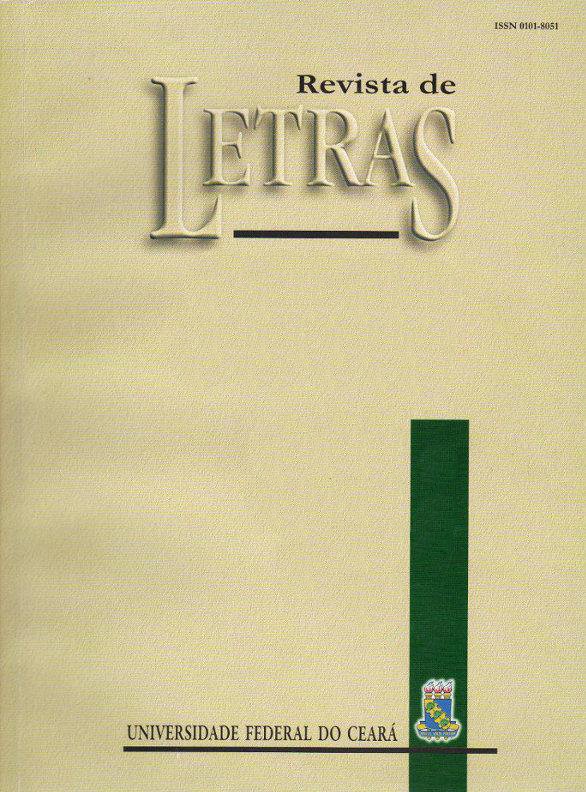VELHICE FEMININA: A SEXUALIDADE RECONFIGURADA NO ESPAÇO NARRATIVO
Resumo
Sob o olhar preconceituoso acerca da beleza feminina, especialmente na velhice, a cobrança de que a mulher deve parecer mais jovem é recorrente. Este trabalho discute a reconfi guração do corpo feminino envelhecido, no modo de relacionar-se com o outro, a partir do conto “Boa noite, Maria”, de Lygia Fagundes Telles, 1998, no qual a voz narra-tiva apresenta-nos uma mulher mais velha cuja relação com um novo companheiro, descrito como um homem “ideal”, é diferente do convencional. Ela decide ser auxiliada por ele na tarefa de morrer, antes que inicie o processo doloroso e degradante que antecede a morte por uma doença incurável. Trata-se, portanto, de uma história de amor e morte. Assim, esse conto se abre para uma discussão que, partindo da euta-násia, coloca em debate o quanto as mulheres velhas podem optar por se iludirem ou se conscientizarem; por terem prazer ou sofrerem; por desejarem o improvável ou serem felizes; por viverem ou morrerem; enfi m, por fazerem escolhas. A narração desse texto traz uma abordagem transgressora da relação entre o homem e a mulher na medida em que esta inverte uma ordem no que diz respeito à idealização do outro. Toda essa construção de uma fi gura masculina cujo olhar é capaz de enxergar outra beleza na mulher que não a oferecida pela massifi cação midiática constitui um redirecionamento do que se encontra na literatura escrita por homens ou sob a perspectiva da dominação masculina, em que a mulher é idealizada. Deste modo, a escritora compõe uma personagem falsamente criada nos padrões da idealização do outro, mas dota-o também de qualidades que permitem a convivência feliz para ambos. Ela faz uma literatura do encontro. Com esse movimento da narração, a escritora articula outro espaço de enunciação. Palavras-chave: velhice feminina, corpo, morte. ABSTRACT Under the prejudiced eye over women’s beauty, specially on the old age, the charging that the woman should look younger is recurrent. This academic work discusses the re-confi guration of the old aged women’s body, in relationships, from the short story “Boa noite, Maria”, of Lygia Fagundes Telles, 1998, which narrative’s voice is represented by an older woman who is in an unusual relationship with a younger man, described as an “ideal” man. She decides to have him to help her in the task of dying, before the painful and unpleasant process that precedes death by a cureless disease starts. Therefore, it tells us about a love and death story. Thus, this tale opens the doors for a discussion that has euthanasia as a starting point and puts in debate how can an old woman choose to get herself delude or conscious; to feel pleasure or to suffer; to desire the improbable to happen or to be happy; to live or to die; to make choices, at last. This text’s narrative brings us a transgressive approach of the relationships between a man and a woman when it has its regular order over the other’s idealization inverted. All this male fi gure making which look is capable of seeing the beauty in a woman who isn’t that one offered by the mass media constitutes a redirection of what is founded on the literature wrote by men or under the male perspective, which in the woman that is the one idealized. The writer, thus, composes a character that is falsely created under the standards of the other’s idealization, but also gives him qualities that allows a happy living together for both. She makes a literature of the meeting. With that narration movement, the writer articulates another space of enunciation. Keywords: female elderly, body, death.Downloads
Não há dados estatísticos.
Downloads
Como Citar
LIMA, Susana Moreira de. VELHICE FEMININA: A SEXUALIDADE RECONFIGURADA NO ESPAÇO NARRATIVO. Revista de Letras, [S. l.], v. 2, n. 32, 2016. Disponível em: http://periodicos.ufc.br/revletras/article/view/1471. Acesso em: 30 dez. 2024.
Edição
Seção
ARTIGOS
Licença
Autores que publicam nesta revista concordam com os seguintes termos:- Autores mantêm os direitos autorais e concedem à revista o direito de primeira publicação, com o trabalho simultaneamente licenciado sob a Licença Creative Commons Attribution que permite o compartilhamento do trabalho com reconhecimento da autoria e publicação inicial nesta revista.
- Autores têm autorização para assumir contratos adicionais separadamente, para distribuição não-exclusiva da versão do trabalho publicada nesta revista (ex.: publicar em repositório institucional ou como capítulo de livro), com reconhecimento de autoria e publicação inicial nesta revista.
- Autores têm permissão e são estimulados a publicar e distribuir seu trabalho online (ex.: em repositórios institucionais ou na sua página pessoal) a qualquer ponto antes ou durante o processo editorial, já que isso pode gerar alterações produtivas, bem como aumentar o impacto e a citação do trabalho publicado (Veja O Efeito do Acesso Livre).

.png)





.png)
